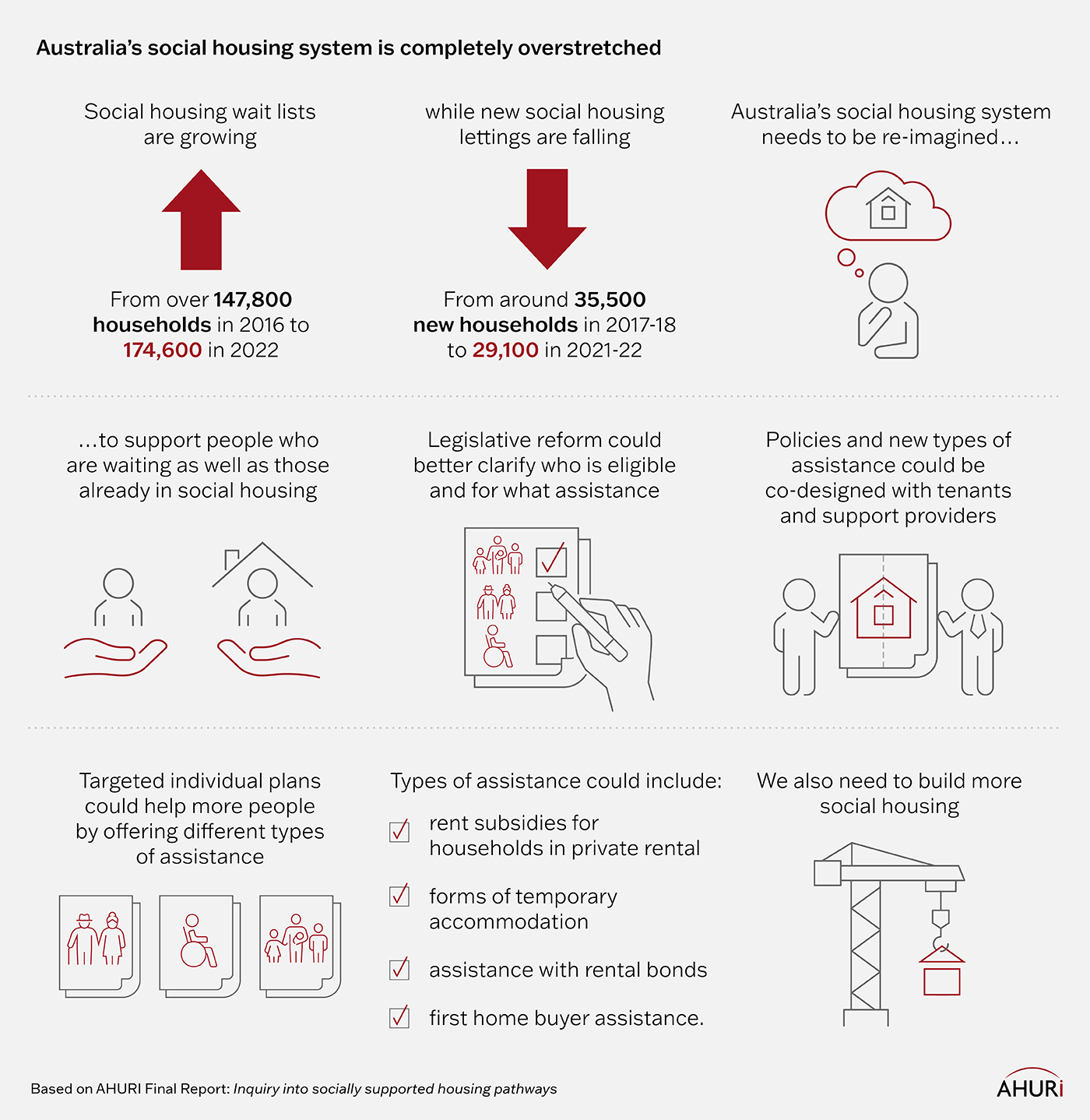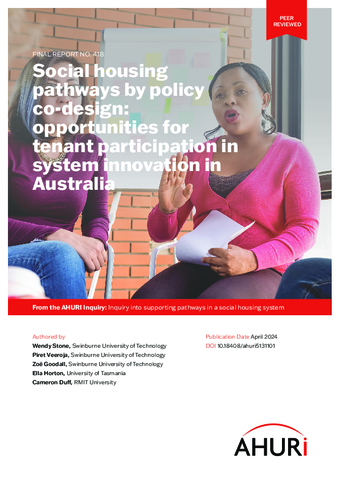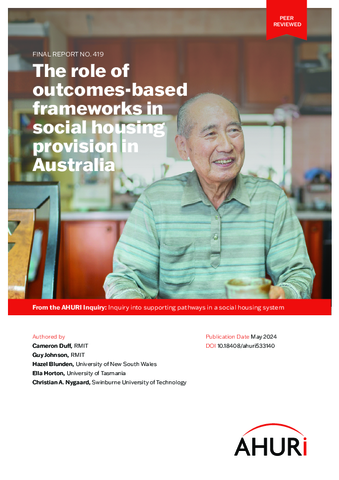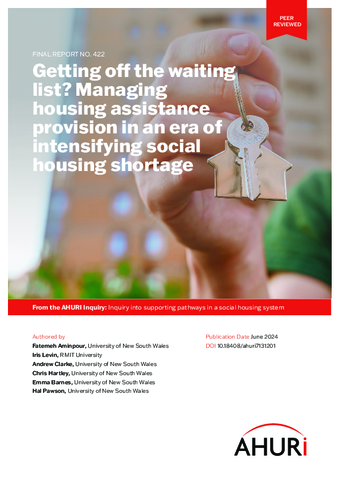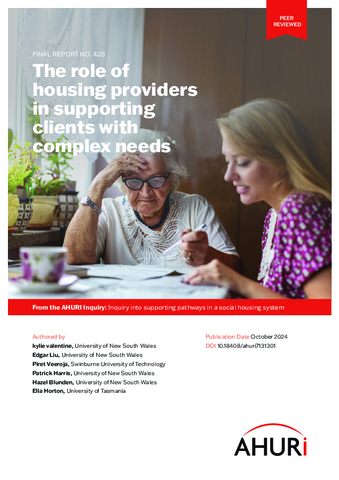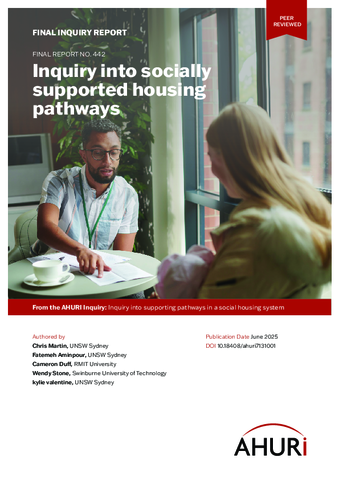Final AHURI Inquiry report
What this research is about
This research Inquiry looked at how to change Australia's housing assistance system into one that supports 'housing pathways'.
Housing policy makers often see 'pathways' as how households move between different tenancies and tenures, including social housing and emergency housing. However, it is useful to think of pathways as the different experiences households have with their housing and their housing aspirations. This helps us think about how housing assistance can support housing pathways and how the social housing system can better support households.
Why this research is important
A better system for socially supported housing pathways could focus on supporting each person and household's needs and goals, rather than being constricted by access to a small number of social housing homes. With social housing getting much-needed extra funding, it is important to also improve how the system works with households that need help.
-
At a glance
-
Key findings
This Inquiry focuses on housing assistance delivered by Australian state and territory housing authorities and community housing providers. It looks at the commitments, design principles, and institutional changes needed to create a system of socially supported housing pathways.
Aspirations
Low-income households have varied housing aspirations and understand that their needs and housing pathways change over time.
Survey results indicate the private rental sector can meet short-term needs but is less effective long-term.
Social housing is seen both as an ideal type of housing and a stepping stone in housing pathways. Responses from applicants and new tenants suggest that their decisions to seek social housing are very deliberate. In general, they would prefer market housing. This is balanced against a realistic assessment of their chances in the market.
Despite growing international interest in policy co-design in human services, Australian social housing and housing assistance policy has limited experience in this area.
Access
Social housing increasingly targets households with acute or ‘complex’ social and health-related challenges. Common criteria include homelessness, escaping domestic violence, severe mental or physical health issues, or disability.
The number of households applying for social housing registers has increased in recent years, while housing allocations have dropped in most jurisdictions.
The application process is often deeply unsatisfactory and upsetting for households. Private rental assistance appears to be a temporary measure, rather than stopping people from needing social housing. Over half of those receiving assistance reported they could not maintain their tenancy.
Private rental assistance schemes are widely seen as ineffective due to limited affordable housing options.
Support
Many social housing tenants have complex needs, and some providers offer coordinated support to meet these needs. Stable housing and time to build trust with service providers can create effective support conditions.
Social housing offers advantages in supporting people with complex needs. Rental subsidy programs in private housing are weakened by poor tenure security and property shortages. High housing costs put pressure on essential spending like food and utilities, increasing demand for support services for low-income households.
People in insecure housing with health and support needs waiting for social housing are less likely to receive support than people with stable housing.
Outcomes
Social housing staff and stakeholders see outcomes reporting as a way to highlight social housing's value.
Outcomes reporting and evaluation provides important evidence to drive service improvements. Best practice can be shared across the sector. However, organisations vary in their evaluation capabilities, with significant differences in outcome monitoring approaches.
Governments serious about outcomes-based funding will need to invest significantly in developing consistent evaluation capabilities.
Current housing support often has weak legal foundations
The housing legislation of most states and territories says little about the operation of social housing and nothing about other forms of housing assistance. The social housing system makes legally weak commitments compared with other support systems, such as social security and disability support.
-
Policy actions
It is timely that housing policy makers consider how to transform Australia’s social housing system. This could involve:
- strategies for the co-design of housing assistance policies
- improving and sharing social housing and housing assistance data
- legislating for clearer authority to provide diverse forms of housing assistance. This could include enshrining housing rights in human rights charters
- promoting individual housing plans where social housing landlords commit to supporting individuals' short and long-term housing goals
- establishing an Australian housing clearinghouse to collect and share housing data and information across states, territories and international examples. It would include participation practices and evaluation outcomes to guide policies.
-
Research design
This AHURI Inquiry comprised four research projects, each producing a Final Report.
The research used multiple methods, including:
- analysing the 2018 Australian Housing Aspirations survey
- surveying social housing applicants and new tenants in three jurisdictions
- interviewing sector stakeholders, workers, social housing applicants and tenants
- conducting two Inquiry Panel meetings with government and non-government housing agencies.


